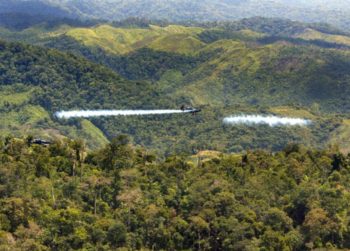 Nebraska regulators set out this week to finally approve the long-awaited Keystone XL oil pipeline. Instead, specialists say, they may have killed it.
Nebraska regulators set out this week to finally approve the long-awaited Keystone XL oil pipeline. Instead, specialists say, they may have killed it.
The Nebraska Public Service Commission (PSC) voted 3-2 Monday to approve a route for the $8 billion Canada-to-Texas pipeline through the state, but not the route that TransCanada, the owner and operator of the project, had wanted.
The new path was approved with little debate or study. The State Department, which reviews pipelines that cross international boundaries, reportedly is examining whether it must conduct a new environmental review, a process that could take years and would come at considerable expense to American taxpayers.
With TransCanada noncommittal on whether it’s even interested in using the PSC’s permit, analysts say Nebraska regulators have made it far less likely the project ever gets completed and turned what was supposed to be the final chapter in the Keystone review process into a possible death blow.
“I am just bewildered by the PSC decision. I think the commission wanted to have their cake and eat it, too,” said Brigham McCown, former administrator of the federal Pipeline and Hazardous Materials Safety Administration.
“The current route has been studied by the federal government for eight years, produced over 800,000 pages of Obama administration [review] documents I think these guys lost sight of the big picture and got caught up in minutiae and did not have the political courage to do what’s right and instead tried to split the baby,” Mr. McCown said. “In doing so, they’ve guaranteed another two- to three-year legal battle and probably have raised the cost of the project another $1 billion or $2 billion for no reason whatsoever.”
Monday’s vote casts doubt on whether President Trump’s campaign promise — reiterated in March when he signed an executive order to revive Keystone — to see the pipeline through to completion. TransCanada, Mr. McCown said, could decide it’s had enough of the endless U.S. review process and simply give up.
Existing portions of Keystone carry oil from Alberta, Canada, to refineries in the Midwest, but the expansion is necessary to move even more fuel to larger refineries on the Gulf Coast.
A PSC spokesperson on Tuesday said the commissioners would not grant any interviews because of the “contested” nature of the Keystone review process. Commissioner Crystal Rhoades, who voted against approval of the pipeline on Monday, argued that there’s been virtually no study of the new route and said that dozens of landowners along the approved path have no idea that their homes and property could be in the way of the project.
Environmental groups, which expected Monday’s vote to signal defeat in their efforts to stop Keystone, instead were given a golden opportunity to potentially kill the project once and for all. Green groups on both sides of the border say the PSC’s vote may not have even been legally binding, meaning courts once again will play a major role in determining the future of the project.
“This is not the route TransCanada proposed and is not the route that has undergone a proper assessment at the U.S. state and federal levels. It’s not even clear that the PSC has the authority to green-light the alternate route,” said Patrick DeRochie, program manager for climate and energy at the Canadian group Environmental Defence.
His comments were echoed by U.S. environmental groups that said they now plan to redouble their legal fight against Keystone.
Meanwhile, a State Department spokesperson told Politico on Monday that officials are looking at whether a new review process is needed. The initial study, undertaken during the Obama presidency, took several years.
In a lengthy document released after Monday’s vote, the PSC said its approved route is a better location because of its proximity to existing pipelines in Nebraska. That fact, along with environmental concerns about TransCanada’s preferred route, led the PSC to make its unexpected decision to OK a different path.
“Ultimately, the preferred route fails to take advantage of any opportunity to co-locate with the existing utility corridor represented by Keystone I, and therefore we are unable to conclude that the preferred route is in the public interest,” the PSC wrote.
TransCanada’s reaction has been muted. The company said nothing Tuesday, and on Monday issued a brief press release saying it would review the PSC permit.
Read more at Washington Times






The environmentalists’ ultimate goal is to shut down oil sand production. Kinder Morgan has federal approval to expand capacity using their existing corridor to Burnaby, British Columbia. BC Greens and natives , reinvigorated by the NDP election victory there, vow to stop it.
Alberta NDP leader, Rachel Notley, is lecturing everyone to see things her way. Alberta needs the money! According to Notley, it’s OK to produce fossil fuels, as long as everyone accepts climate change. The sooner all sides agree that CC is real, the sooner pipelines will get built. Cognitive dissonance is the answer!
Canada is used to NDP-speak, but there’s a family feud brewing.
There’s a perfectly suited deep water port in Churchill Manitoba. A much shorter pipeline could be built directly from Ft. Mac to Churchill. Shipping times are actually much shorter than going through the St. Laurence seaway.
Simply bypass all of the Left Coasts and go directly to world markets.
The protesters could snuggle up with Churchill’s polar bears, maybe feed them.